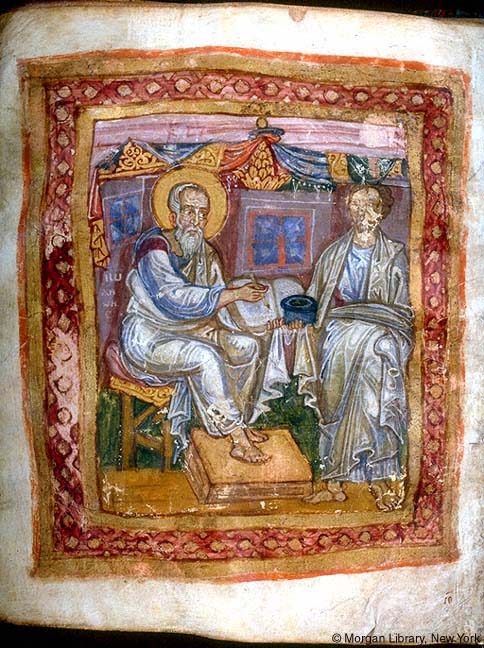Laws are always theologically based, whether or not they are so acknowledged.
Herbert Schlossberg in Idols for Destruction

New Marcionites
I’ve noticed recently that a number of Christians when discussing Scripture seem to relegate the Old Testament as sub-standard. The law of God is particularly shunned. Comments like “I see you are quoting from the Old Testament, but we are New Testament Christians,” abound. It’s almost as though these people think Christ has done away with the Old Testament. These are our modern-day Marcions.
To respond, we must first of all look at how Jesus viewed the Law. In Matthew 5 in the Sermon on the Mount Jesus explains the Christian approach to the Law and the Prophets (the majority of the Old Testament.)
Do not think that I have come to abolish the Law or the Prophets; I have not come to abolish them but to fulfil them. For truly, I say to you, until heaven and earth pass away, not an iota, not a dot, will pass from the Law until all is accomplished. Therefore whoever relaxes one of the least of these commandments and teaches others to do the same will be called least in the kingdom of heaven, but whoever does them and teaches them will be called great in the kingdom of heaven. For I tell you, unless your righteousness exceeds that of the scribes and Pharisees, you will never enter the kingdom of heaven. – Matthew 5:8-20
Sometimes people remember the fact that Jesus came to fulfil the Law, and assume this means he has done away with it. But the very context does not support this. Fulfil cannot mean abolish, since it is contrasted with that word. Jesus does not abrogate the law, he fulfils it for us. This does not mean the law has no relevance to the life of the Christian anymore. According to Christ, people who teach that will be least in the kingdom of heaven! Hardly a view he endorses.
Paul himself, when writing to Timothy wrote these famous words.
All Scripture is breathed out by God and profitable for teaching, for reproof, for correction, and for training in righteousness, that the man of God may be complete, equipped for every good work. 2 Timothy 3:16-17
When Paul wrote these words, the only Scripture that was available to the church was the Old Testament. For Paul then, the Old Testament Scriptures are profitable and enable the man of God to be trained and fully equipped for every good work. Consequently as Greg Bahnsen points out in By this Standard “If we disregard any portion of the Bible we will – to that extent – fail to be thoroughly furnished for every good work. If we ignore certain requirements laid down by the Lord in the Bible our instruction in righteousness will be incomplete.“
Certainly, more could be said on the role of the Old Testament, and particularly the Law in the life of the Christian, but at the very least we should be very sceptical of those who would seek to denigrate Old Testament Scripture as irrelevant for the Christian.

Lessons from the Gulags – Part 2
As I mentioned in the first installment, Alexander Solzhenitsyn was both burdened and blessed with the misery of the Russian gulags. Burdened because he was a victim and witness to horrors that most cannot begin to imagine. Blessed because he learned the lessons that the gulags had to teach.
I want to explore one such lesson here today. A lesson about the face of evil and the ways in which ideology gives evil the necessary fuel to really take off and soar into space.
Read MoreWestminster Confession of Faith 1.9 – Scripture Interprets Scripture
The week has flown by and we are back to Wednesday again which means Westminster Confession of Faith day! Last week we focused on the authority of the original languages. While these are the final authority, we learnt that good translations in the language of ordinary people are good and necessary. Today we look at the penultimate point in the first section of the Confession ‘Of the Holy Scriptures’ and our key focus today is the way Scripture is its own interpreter.
IX. The infallible rule of interpretation of Scripture is the Scripture itself: and therefore, when there is a question about the true and full sense of any Scripture (which is not manifold, but one), it must be searched and known by other places that speak more clearly.
What do we learn here? Firstly, that Scripture interprets Scripture. We have seen hints of this in WCF 1.7 where we learned of the perspicuity of Scripture. The “things which are necessary to be known, believed, and observed for salvation“ are clear to such a degree that ordinary people can by ordinary means of careful reading understand the Scriptures. The point made here is related. We do not need an authoritative Church to interpret Scripture for us. The Scriptures are authoritative and we look to them to understand them! Note for example how Paul charged Timothy in 2 Timothy 2:15 to work diligently to be a man who rightly handles the Word of Truth. In Acts, the Berean Christians were noted for their noble-mindedness when Paul preached to them. What did they do? They examined the Scriptures daily to see if what Paul was teaching was what the Scriptures taught (Acts 17:11).
Secondly, we are informed in passing that there is one right and true sense of any Scripture. Wilkinson in his study of the Confession mentions that medieval scholars spoke of four levels of meaning in a text, and there was a tendency to allegorise Scripture which led to a twisting of Scripture by some to make it say whatever they already believed. This ought to be avoided. Even today, in some Christian circles the tendency to allegorise is a problem. I remember preaching a sermon on David and Goliath and after the service a man came up to me and explained to me the real meaning of the five smooth stones. The details are no longer clear in my mind, but I do remember him speaking of the smooth stones and the many aeons of water and physical weathering and hitting up against other rocks that made them ready to be used by David in his takedown of Goliath. God’s works in our lives to make us smooth stones ready for his use. What he said was not bad or evil, but clearly not what the passage is about.
How do we understand what a given Scripture is saying? We must interpret it in a literal manner. And here, Wilkinson is again helpful. Some of our godly brothers misunderstand the meaning of literal and take it to mean literalistic and they tend to approach Scripture in a wooden way. A literalistic reading might argue that the Scripture teaches the earth is flat because four corners of the earth are spoken of, or that people will literally have 666 written on their hands and forehead. What we mean by literal is taking into account the genre and understanding how language is used within this genre to determine what the author intended to say. It will not do to read, “He kicked the bucket” and assume a literalistic interpretation of a chap booting a poor defenceless bucket. A lot more could be said here, and perhaps in the future we will look at this in more detail.
Finally, we are given the well-known principle that we must let the places where Scripture speaks more clearly be our guide. Many have taken obscure passages out of context, misinterpreted them and made whole doctrines out of them. This will not do. We must let all of Scripture help us interpret any one Scripture, allowing the more clear to help us determine the meaning of the less clear.
Monday Meme
Feel free to share widely.

How’s That Line in the Sand Going?
GUEST POST – Scott Kennedy
It’s been over a week now since I went public with the article “My Line in the Sand”. What a rollercoaster ride! In this time I’ve been inundated with messages some supporting my line in the sand, some suggesting I smooth over the sand and choose a new location for the line, and others questioning my character, sanity and motivations. So in this piece I will share my reflections on the reaction to my article.
The Positives
Firstly let me reflect on some of the positives. A highlight for me has been realising I am not alone. There are a lot of us out there. Never before in my life have I received so many encouraging messages about what I am doing most of them from complete strangers. Thank you to all of you who shared messages of support. Our family was blown away with the support and humbled to see the care and concern of many for our plight, and the plight of many good citizens in New Zealand.
A number of supporters have been extremely generous. There have been suggestions and practical tips to help deal with stress and anxiety (thanks Juana from The BFD), multiple offers of financial assistance should we require it, offers of a holiday spot for the family this summer, offers of work, offers of help setting up a small business and many new contacts and alliances formed. Frankly, I’ve been astounded by the love and generosity of these people many of whom have come from the Christian community, and most who do not know me personally.
Read More
Westminster Confession of Faith 1.8 – Original Languages Authoritative
Wednesday is Westminster Confession of Faith day! Last week we focused on the perspicuity of Scripture and found that while there are some sections of Scripture that are difficult to understand and can be twisted by a certain type of person, the things pertaining to our salvation are so clear that ordinary people by ordinary means of careful reading can understand them. Today we look at the issue of original languages and translations.
VIII. The Old Testament in Hebrew (which was the native language of the people of God of old), and the New Testament in Greek (which, at the time of the writing of it was most generally known to the nations), being immediately inspired by God, and, by His singular care and providence kept pure in all ages, are therefore authentical; so as, in all controversies of religion, the Church is finally to appeal unto them. But, because these original tongues are not known to all the people of God, who have right unto, and interest in the Scriptures, and are commanded, in the fear of God, to read and search them, therefore they are to be translated into the vulgar language of every nation unto which they come, that the Word of God dwelling plentifully in all, they may worship Him in an acceptable manner; and, through patience and comfort of the Scriptures, may have hope.
The first thing the framers of the Confession alert us to is the importance of the original languages. The Old Testament was written in Hebrew (mainly) and the New Testament in Greek. It is to the original languages that we must go for final appeal when there is a controversy over what the Scriptures say, as these are the words ‘immediately inspired by God.’ This was written into a context where the Roman Catholic Church relied on the Latin Vulgate, a translation with some serious flaws. It’s also important to note that the framers saw the way God’s inspired Word had been kept pure by His providence. Despite the period of time between the original writings and now, we have remarkable witness in the manuscripts that testify to the accuracy of the transcription process. This is best exemplified by the finding of manuscripts at Qumran, which although about 1000 years older than the ones possessed at the time, were remarkably consistent with them.
Secondly, the writers of the Confession wanted to highlight another error of the Roman Catholic church of the time. They realised that while it was important for scholars to be able to go back to the original languages, this was not possible for the vast majority of the common people. Therefore, it was deemed right and helpful for the Scriptures to be translated into the ‘vulgar’ (or common) language of every nation to which the faith came. This would allow ordinary and less-schooled Christians to be able to let God’s Word dwell in them richly. This was something that the Roman Catholic Church was not so keen on in those days, but now is in agreement with the Reformers on.

Love Your Neighbour and Get Your Vaccine?
One of the most common arguments that has been repeated again and again across the last year and a half is that we should all get vaccinated to protect the vulnerable. Or in Christian circles, we should get vaccinated as an act of love for our neighbours. The expanded version goes on to talk about how we might not be worried for our personal health with respect to COVID, however, if we are unvaccinated and gather in groups, we place others at risk. We should not stubbornly hold on to our personal rights and preferences at the expense of others. To do so would be unloving and selfish. If we can reduce the risk that others face from COVID why would we not get the vaccine? Some even go further and suggest that because of these considerations, it is right and just for the government to mandate vaccines for large swathes of the population.
While I can see the appeal of this kind of argument, I am convinced that this reasoning is massively inconsistent with the Biblical framework for ethics.
Read More
Lessons from the Gulags – Part 1
Introduction
Apart from books on theology and Christianity, no book has had a bigger impact on me than The Gulag Archipelago by Alexander Solzhenitsyn. The author was a decorated soldier in the Russian army who was later sentenced to eight years of hard labour in the Russian gulags. His great life’s work, The Gulag Archipelago, documents the atrocities of Communist doctrine applied to the people of Russia. His three-volume work brought the Soviet Union to its knees and made the label communist a slur among all reasonable people.
Read More
Westminster Confession of Faith 1.7 – Perspicuity of Scripture
Today we continue our walk through the Westminster Confession of Faith. Over the last month or so we have looked at the first section of the Confession which is focused on the Scriptures. In our most recent short post on the Confession, we highlighted that Scripture does not need adding to either with the traditions of men or ‘inward illumination’. We also discussed the concept of the sufficiency of Scripture and identified some important implications of these doctrines. Today we look at the perspicuity (or clarity) of Scripture.
VII. All things in Scripture are not alike plain in themselves, nor alike clear unto all: yet those things which are necessary to be known, believed, and observed for salvation, are so clearly propounded and opened in some place of Scripture or other, that not only the learned, but the unlearned, in a due use of the ordinary means, may attain unto a sufficient understanding of them.
The first thing that the framers of the confession note is that all things in Scripture are not equally easy to understand. Peter himself points out that Paul’s writings contain some difficult concepts (2 Peter 3:16). The book of Revelation seems to defy its own name, with Christians who have a high view of Scripture disagreeing as to its interpretation. It’s important to make a distinction at this point. God is a good communicator – the best in fact, since language comes from Him. So God speaks clearly in His Word, but that does not mean that no doctrines contained in Scripture are not difficult. Scripture teaches the concept of the trinity clearly, but this is not an easy thing to understand. Williamson in his book on the Confession puts it this way, ‘The clearest possible expression of Einstein’s theory of relativity does not make it “simple.” ‘Added to this is the complication that we are fallen, and there are even ‘ignorant and unstable men’ who twist and distort what God has said in his Word.
Secondly, we are informed that the things pertaining to our salvation – what we must know, believe and do, are so clearly expressed in Scripture, that even unlearned people who appropriately use ‘ordinary means’ can gain sufficient understanding. How we are saved is abundantly clear from Scripture. An ordinary layperson can determine this from Scripture. We do not need a special class of Christian to teach these things to us. This doesn’t mean that gifted teachers are unhelpful, but that the Scriptures, when read carefully, thoroughly and regularly, are sufficiently clear that ordinary men can read them and with the Spirit’s enabling understand the way of salvation and be saved.
One important phrase in this statement is “in a due use of the ordinary means“. There is a call for us here to be diligent in the reading and studying of and meditation on the Scriptures. I have been encouraged to continue my efforts in reading through the breadth of God’s Word with my family in our evening and morning Bible times rather than just sticking to the well-worn paths in Scripture.